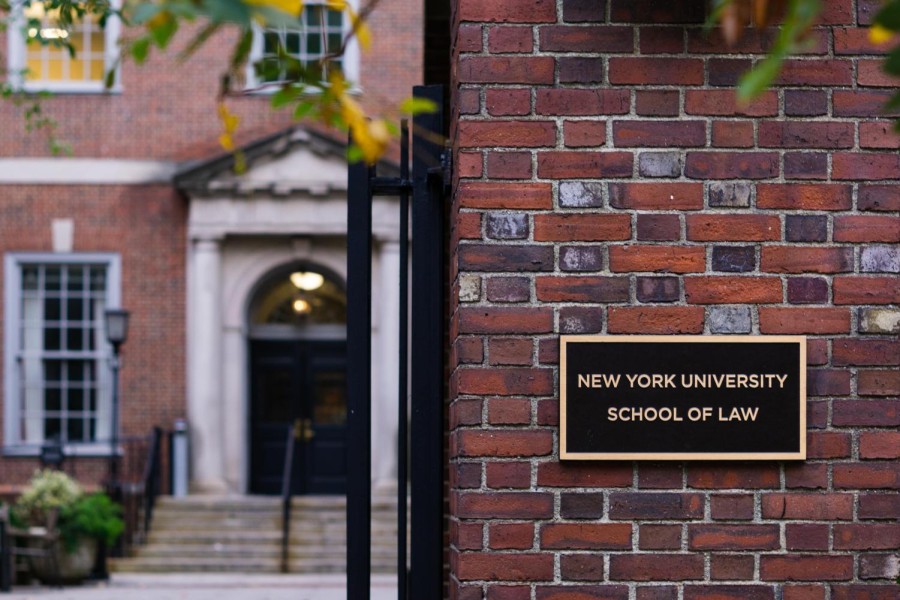Teach-in condemns NYU Law Policing Project
Two NYU School of Law groups hosted a teach-in to discuss the funding and research of the school’s Policing Project, which they say harms marginalized communities.
Teach-in protests against NYU School of Law’s Policing Project claim the project’s sponsors support the prison-industrial complex and heighten tension between communities of color and the police. (Photo by Kevin Wu)
April 25, 2022
More than 70 NYU community members participated in a virtual teach-in about the NYU School of Law’s Policing Project on April 20. The event was hosted by the NYU Law student organization Ending the Prison Industrial Complex and the NYU Law chapter of the National Lawyers Guild. The groups issued a joint statement to NYU Law dean Trevor Morrison and the school community claiming that the Policing Project legitimizes violence against marginalized communities.
“This teach-in is focused on NYU’s Policing Project and its complicity in causing community harm — specifically through some of the funding streams as being directly funded by police weaponry, police surveillance and police technology,” said Stephanie Kerr, a third-year J.D. candidate who moderated the event. “Those industries are really directly subsidizing NYU research.”
The Policing Project is a law school initiative focused on making police departments more transparent and equitable by enabling democratic participation and fostering accountability. The EPIC and NYU NLG statement — which was signed by numerous NYU Law students and student groups — notes that the project is funded by organizations that manufacture or sell policing technologies, including ShotSpotter, Axon, Mark43, Amazon Web Services and Microsoft.
“This is an extremely alarming example of police agencies and the for-profit surveillance industry directly subsidizing NYU ‘research’ that those funders then use to expand their violence,” the statement reads.
Valentina Villarroel, an event participant and program coordinator at the Office of Special Programs for the University of Chicago, previously organized a campaign in Chicago against ShotSpotter, whose system is used to detect gunfire. ShotSpotter CEO Ralph Clark previously sat on the advisory board of the Policing Project.
Villarroel argued that ShotSpotter’s services can be used to uphold racist beliefs. The surveillance system uses microphones to detect sounds of a potential gunfire, then alerts police who deploy forces to the neighborhood. She said that the company’s claim of a gunshot detection accuracy rate of 97% is incorrect.
“It’s also the question of ‘even if it works, we don’t want this in these communities, right?’” Villaroel said. “The idea is we’ll make it better, it’ll work, it’ll fit within this larger narrative of ‘we are improving the way that we take care of people,’ but surveillance doesn’t take care of people. These alerts really only heighten the already very dangerous, tense relations between Black and brown communities and police.”
Kerr said she hopes the teach-in will spark continued action against reactionary policing reform in the NYU community. She urged those who are interested to reach out to both organizations who hosted the event.
“This harm is really major, and it’s really impactful, and I do think that students and alums have a lot of power and influence if we come together and push against these structures,” Kerr said. “Hopefully, this is the beginning of something really, really exciting and powerful.”
New York Gov. Kathy Hochul announced on March 23 at a graduation ceremony for new officers that the New York City Police Department had signed onto the 30×30 Initiative, an initiative developed by the Policing Project. The initiative involves a pledge to increase the percentage of female officers in the police force by 30% by 2030.
The 30×30 Initiative’s leadership is composed of a coalition of police leaders, researchers and organizations who advocate for the diversification of police departments. NYU Politics Ph.D. candidate Porey Lin said the initiative could help reduce crime in the city.
“Research shows the critical importance of police departments reflecting the demographic diversity of the communities they serve, and gender diversity is an important component of that,” Lin said. “Diversification in the NYPD won’t go a long way if new recruits of under-represented groups are only placed in certain precincts … The reform needs to make sure that precinct assignments of recruits are either randomized or based on measures outside of race or gender.”
Maureen McGough, the co-founder of the 30×30 Initiative, said the pledge also aims to promote equitable and unbiased hiring practices in order to foster an inclusive workplace culture within participating police departments.
“Research suggests women officers use less force and excessive force, are perceived as more trustworthy, are associated with better outcomes for crime victims — especially victims of sexual assault, and are named in proportionately fewer citizen complaints and law suits,” McGough wrote to WSN. “Initiatives like 30×30 are critical to ensuring police departments are able to hire, retain, and promote the best people for the job.”
[Read more: NYU Law Policing Project wants to curb police brutality by hiring more women]
Third-year doctoral candidate Chloe Truong-Jones said she disagrees with the initiative’s goals and premise. She said that initiatives like the Policing Project misplace the blame for police violence. She instead argues for abolition of the police.
“Attempts to increase the representation of women in police forces are pitched as a kind of female empowerment, but feminism requires abolition, and increased policing only means increased violence towards women of color and other vulnerable women,” Truong-Jones said. “I don’t think anyone feels particularly empowered being arrested by a female officer.”
Contact Isabella Tapia at [email protected].

























































































































































Jack Li • Apr 25, 2022 at 3:58 pm
This is the reporting we need